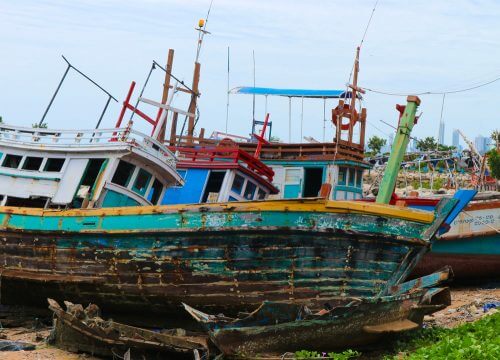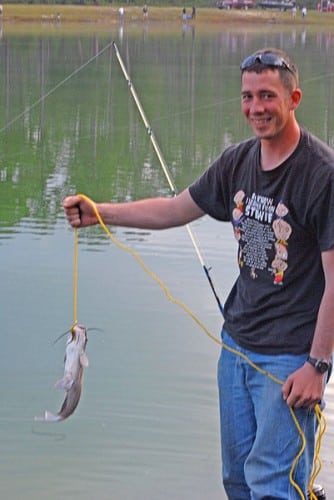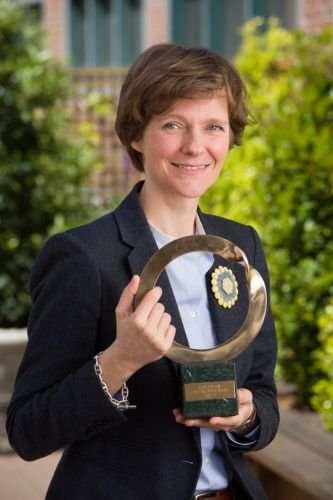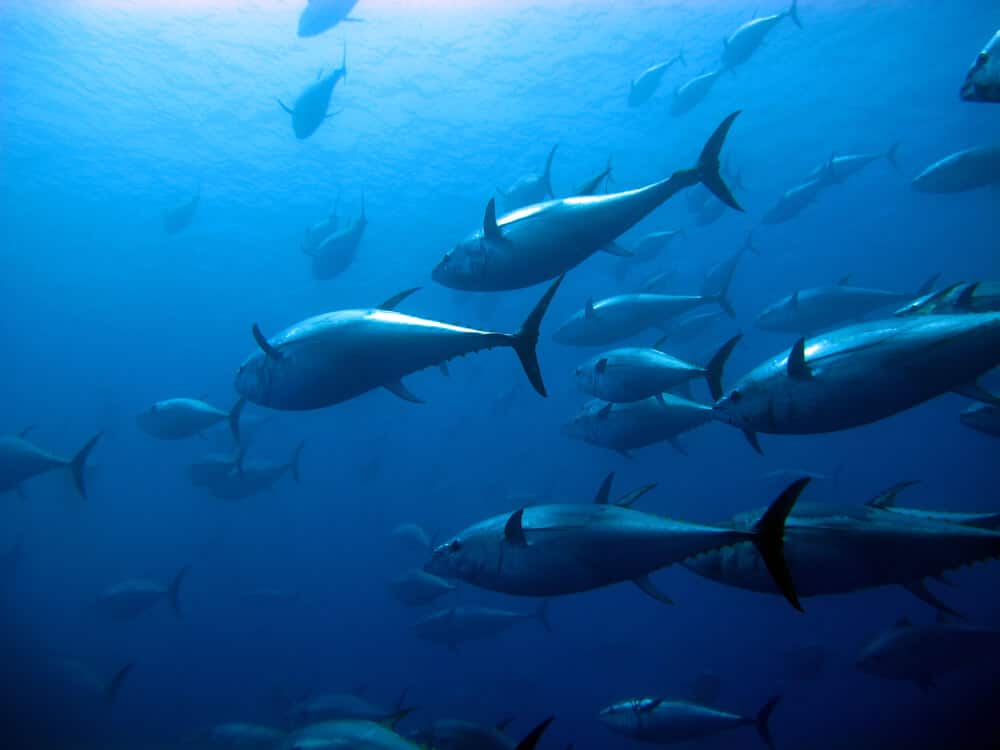A special interview with Claire Nubian, the recipient of the 2018 Goldman Prize for the Environment, who managed to change the fishing laws in Europe and who continues to try and save life in the sea
By Ran Ben Michael, Angle, Science and Environment News Agency

In 2001 it was sent Claire Nubian, An investigative journalist who was then working for a French TV channel, to make a documentary about Monterey Bay Aquarium in California. Nubian didn't know it at the time, but this routine journalistic assignment would change her life.
During her work on the film, Nubian learned about the unique characteristics of the ecosystem Extraordinary that takes place in the deep sea and the destructive influence of humans on it. Nubian collected the results of her discoveries about the deep sea and its inhabitants in a documentary book called The Deeps (The Deep). The success of the book led to an exhibition that she curated and traveled around the world (one of the first places where the exhibition was shown outside of Paris was the Bloomfield Science Museum in Jerusalem under the title A journey to the depths of the ocean).
At the same time, Nubian decided to make a professional conversion from journalism to environmental activism. In 2005 she founded Bloom (Bloom Association), an association for the preservation of marine nature, which successfully led campaigns to change the European Union's fisheries policy. Thanks to this work, this year Nubian won in the Goldman Award for the Environment, which is also known as the "Green Nobel" and which is considered the most important award in the field of ecology and the environment.
The Goldman Prize was founded in 1990 by Richard and Rhoda Goldman, Jewish philanthropists who supported (also in Israel) extensive environmental and social activities through a foundation founded in 1951. The prize is awarded annually to environmental activists in six regions: Africa, Asia, Europe, North America, Central and South America, and island countries. The award honors the local activists who work to promote civic and community involvement in achieving positive environmental change in their area, sometimes while risk their lives.
to the prize winners A cash prize, media coverage and a series of meetings with political leaders in the United States are awarded.

Beat the supermarket
Nubian says in a telephone interview that even though her activities have received considerable exposure over the years, winning the award has turned the spotlight on the organization she heads and on the people who work there and not just on the critical content they produce. "Unlike other large organizations, we did not care about our public relations, but only about our message about the problems in the world, but now we are known as an organization with its own identity," she says in a telephone interview.
Bloom's flagship campaign Focused on imposing restrictions to reduce trawl fishing in the deep sea, which causes severe damage to many species of marine animals and which destroys habitats so badly that it will take thousands of years for them to recover from this damage, if at all they will be able to recover: "Deep sea trawl fishing is the most destructive fishing method employed on the most sensitive system.”
According to Nubian, Bloom is an organization "whose activity is science-based and rigorous. We collect information, analyze it and publish it. Therefore, when we publish something publicly, we know what we are talking about." Thus, for example, the campaign that focused on the activities of the large French supermarket chain Intermarche, It also included an ongoing investigation by the fleet on the trawl fishing fleet operated by the network. The investigation indicated that this is an ecologically destructive and technically unsuccessful activity Economic development. Thus, although the network has been supported through subsidies, debt cancellation and grants, the trawl fleet consistently operates as a losing business.
The campaign led by Nubian also included A viral petitionת which gathered more than 900 signatures and which succeeded in getting the supermarket chain - and later also the French and British governments, as well as the European Union institutions - to adopt self-constitutional limits on trawl fishing in the deep sea. Indeed, since 2016 it is forbidden to use this method in European waters at a depth exceeding 800 meters.
Today, the organization is focusing on a campaign to ban another fishing method - fishing with electricity (pulse). In this method, the net is not dragged on the ground but near it and a low voltage electric current is released from the rods attached to me to "encourage" the bottom fish to come up from it. This causes less damage to the habitat and consumes less diesel, because less effort is invested in towing the net, but Novian says that the electrification causes environmental damage: It is not targeted at the target fish and affects all life stages of the fish (such as fertilized eggs or juveniles that have not yet reached maturity). Although the method has not been allowed in the Union since 1998, due to Dutch pressure, its use has expanded under the title of "scientific research" to examine its application as a substitute for trawl fishing.
At the beginning of the year the European Parliament adopted Prohibition Also about this fishing method, although there is a dispute about the environmental and economic damage it causes. Novian claims that this controversy is not real and that "the science of the industry is biased and mobilized in favor of the self-interest of industrial fishing. They are interested in catching as many fish as possible, the number of which is decreasing. But the industry is not shrinking at the same time, on the contrary, it is growing and they are using all the known tricks to invalidate our claims that are based on science, data integrity, transparency. The offensive fishing methods have negative effects on everyone except industrial fishing, on the marine environment, on the fish stock and on the employment of independent fishermen, those who operate small vessels."

And what is happening here in Israel regarding the issues Nubian deals with? "Trawler fishing in deep water is not common on Israel's Mediterranean coast and fishing using an electric current generator is prohibited. The main trawl fishing ranges between depths of 150-30 meters," says Dr. Adi Levy, the scientific director of the Israeli Association for Ecology and Marine Ecologist.
"At the end of 2016, the Knesset's Economic Committee approved the new fishing regulations, which included a significant reduction in the scope of trawl fishing in Israel," says Levy. "The minimum depth for this fishing method has increased from 15 meters to 30 to prevent damage to rocky habitats that have a high variety of fish and marine invertebrates; Trawl fishing is stopped every year in the summer for 90 days - in the season when the young fish join the adult population - this is to reduce the by-products and damage to the sea turtles. It is also prohibited to use the beam attached to the front part of the net and dragged on the seabed or balls, tires and wheels attached to the net, and designed to make it easier to drag it over rocks. Trawl fishing was banned from the coast of Dor and to the north, and the size of the Israeli trawl fleet was reduced by about a third, while financial compensation was provided to the fishermen who were pulled from the sea.
Pessimistic forecast
On June 8, the world will celebrate International Oceans Day, but Nubian's mood is not very festive and not at all optimistic. When she is asked, for example, about the future of the Mediterranean Sea, she believes that the problems that exist everywhere are becoming more acute: "Everything in the Mediterranean Sea is on a larger scale: there are less fish, more pollution, everything is worse. I don't have much hope and I don't see an honest desire for change for the better." In a broader context, she believes that corporations become stronger and gain the support of political actors while betraying citizens and democracy because their economic logic requires environmental harm "We are still on the way to even bigger troubles. If the human race was based more on knowledge and less on faith, we would be able to turn to a way of cooperation which is the one that will get us out of this mud."
Despite the lack of optimism, Novian identifies a possible key to change for the better through the elimination of fishing subsidies: "60 percent of the world's subsidies are directed to overfishing or illegal fishing. Recently, the interest in sea pollution has increased, but we need to continue to focus on what is taken from the marine system through fishing."
Blum and other organizations seek to lead to the elimination of financing through subsidies - which are worth about 35 billion dollars a year - through the International Trade Organization (WTO), but The move was unsuccessful So far due to the opposition of countries such as India and China, although it is consistent with implementaion The Sustainable Development Goals of the United Nations.
According to Nubian, each of these changes - whether it is the subsidy policy in the various countries or the decisions of the European Union institutions on fishing methods - "is an issue that requires a lot of hard work. Preservation of marine nature will continue to be a Sisyphean and difficult task."

More of the topic in Hayadan:
- Sea bass populations in the oceans have shrunk by half in the last 45 years * The tuna, mackerel and pallid are in danger of extinction due to overfishing
- By the middle of the century there will be no fish left in the sea
- A Jew likes fish? - Chapter three - Tiberias: the capital of the Galilean fishing

One response
And not a word about invasive species,
Wake up people, Egypt is using ecological terrorism against the Mediterranean countries when it does not take care of preventing the migration of invasive species from the Red Sea to the Mediterranean Sea and also built the Aswan Dam which prevents the passage of silt into the Mediterranean Sea. Egypt is destroying the Mediterranean ecosystem. The venomous jellyfish on the shores of the Mediterranean are an invasive species from the Red Sea and are spreading.